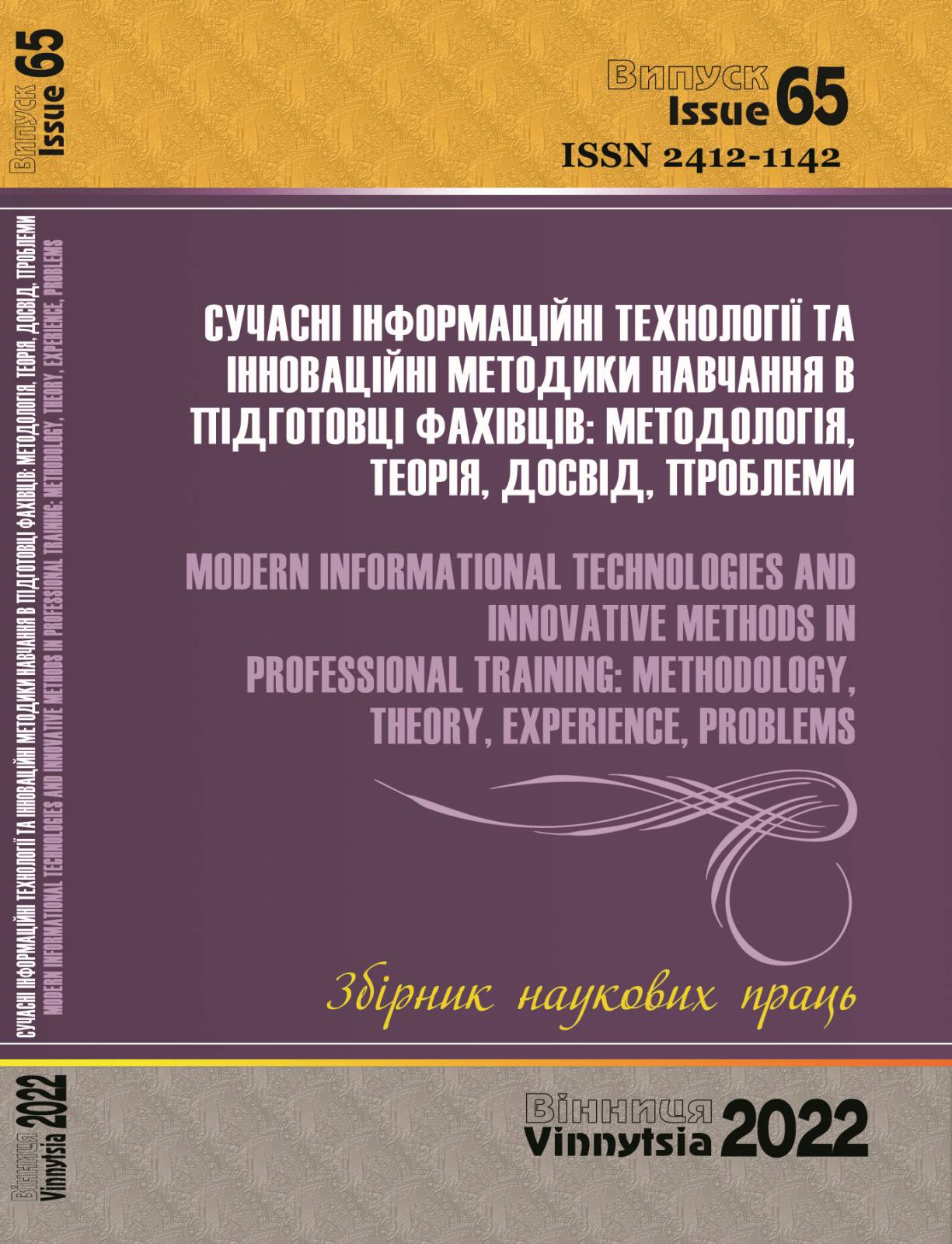MUSEUM PEDAGOGY AS A MEANS OF FORMING THE GENERAL CULTURAL COMPETENCE OF PEDAGOGICAL EDUCATION APPLICANTS
DOI:
https://doi.org/10.31652/2412-1142-2022-65-114-123Keywords:
general cultural competence of prospective teachers; museum pedagogy; pedagogical activities of museums; technology for the development of general cultural competence by means of museum pedagogyAbstract
In the study the term “museum pedagogy” was defined, the tasks of museum pedagogy were
cleared up, the models (European, Anglo-American, Eastern European) of museum pedagogical activity
were characterized. The research presented the technology of developing general cultural competence of
prospective teachers by means of museum pedagogy, which was represented by the following
components: the purpose of learning, didactic principles; content, methods, means of education;
organization forms of training; the result of activity. The authors designed the technology of the
development of general cultural competence of prospective teachers by means of museum pedagogy. Its
components were revealed in detail, namely: cognitive, value-oriented, communication and activity
components. The organizational, experimental, expositional, and expert stages were described. Based on
the well-founded structure of general cultural competence and its criteria, indicators of the development
of general cultural competence of prospective teachers by means of museum pedagogy were developed.
Didactic conditions for the successful development of general cultural competence of prospective
teachers by means of museum pedagogy have been practically implemented: 1) identification of signs and
indicators of the development of all components of general cultural competence by means of museum
pedagogy; 2) selection and implementation of pedagogical tasks that contributed to the development of
each structural component of general cultural competence; 3) application of a systematic approach with
definition of the goal, structuring of content, selection of methods, means and forms of design of
experimental technology; 4) use of specific opportunities and educational potential of museum pedagogy,
active learning methods, museum objects and museum environment, figurative language of exposition and works of art. The results of the experimental study were presented, which allowed affirming the
positive dynamics of the development of general cultural competence of prospective teachers by means of
museum pedagogy.
Downloads
References
Falk, J. H., Dierking, L. D. (2013). The Museum Experience Revisited. Walnut Creek, CA: Left Coast Press.
Kun-Ott, H. (2008). Qualitätskriterien für Museen: Bildungs und Vermittlungsarbeit. Berlin: Deutscher
Museumsbund.
Noschka-Roos, A. (1994). Besucherforschung und Didaktik: ein museum-spädagogisches Plädoyer. Berlin: VS
Verlag für Sozialwissenschaften.
Nadolska-Styczyńska, A. (2016). Nie tylko lekcje i oprowadzanie. Kilka uwag o polskiej edukacji muzealnej i
sposobach jej badania. Journal of Urban Ethnology, 14, 95–111.
Nalaskowski, A. (2004). Muzeum przedmiotów szkolnych jako integralna część szkoły laboratorium. Acta
universitatis Nicolai Copernici Nauki humanistyczno-spoleczne. Historia wychowania. Toruń, 365, 5–8.
Pater, R. (2017). Edukacja muzealna – wychowanie do aktywnego uczestnictwa w kulturze. Parezja, 1 (7),
–92.
Ziębińska-Witek, A. (2011). Historia w muzeach: Studium ekspozycji Holokaustu. Lublin: Wydawnictwo
Uniwersytetu Marii Curie-Sklodowskiej.
Zduńczyk, E. (2015). Człowiek w muzeum, czyli rzecz o edukacji, wychowaniu i rozrywce. Kwartalnik
Naukowy, 1 (21), 169–184.
Dierking, L. D. (1994). Rôle de l’interaction sociale dans l’expérience muséale. Publics et Musées, 5, 19–43.
Fortin-Debart, C. (1999). Analyse de l’offre des institutions muséales en médiation environmentale. Aster, 29,
–100.
Rasse, P. (1999). Les musées à la lumière de l’espace public. Histoire, évolution, enjeux. Paris: Editions
L’Harmattan.
Bennett. T. (1995). The Birth of the Museum: History, Theory, Politics. London: Routledge.
Johnson, A., Huber, K. A., Cutler, N., Bingmann, M., Grove, T. (2009). The Museum Educator’s Manual:
Educators Share Successful Techniques. AltaMira Press.
Hooper-Greenhill, E. (1991). A New Communication Model for Museums. Museum Languages: Objects & Texts.
Ed. G. Kavanagh. Leicester: University Press, pp. 59–60.
Simon, N. (2010). The Participatory Museum. Santa Cruz: Museum 2.0.
Бєлофастова, Т. Ю. (2003). Педагогічні засади діяльності музею як соціально-культурного центру: дис.
... к. пед. н.: 13.00.06; Київський національний університет культури та мистецтв. К., 2003. 192 с.
Вербицька, П. В., Пасічник, Р. Е. (2017). Музей як комунікативний та освітній простір: навч. посібник.
Львів: видавництво Львівської політехніки.
Камінська, В. (2013). Музейна педагогіка в практиці сучасного ЗНЗ. Волинський музейний вісник: наук.
зб.: Музейна педагогіка. Теорія і практика, 5, 50–53.
Караманов, О. В. (2020). Теорія і практика педагогічної діяльності музеїв в сучасному освітньому
просторі України: дисертація на здобуття наукового ступеня доктора педагогічних наук зі спеціальності
00.01 – загальна педагогіка та історія педагогіки. Державний заклад “Луганський національний
університет імені Тараса Шевченка”, МОН України, Старобільськ.
Ключко, Ю. М. (2014). Місія сучасного музею у контексті освітніх проблем. Культура і мистецтво у
сучасному світі. Наукові записки КНУКіМ, 15, 43–48.
Волошина, О. В. (2016). Використання активних методів навчання при викладанні дисциплін
педагогічного циклу. Наукові записки Вінницького державного педагогічного університету імені
Михайла Коцюбинського. Серія: Педагогіка і психологія, 48, 13–16.
Dmitrenko, N., Voloshyna, O., Melnychuk, D., Holovska, I., & Dutka, H. (2022). Case method in quasi-
professional training of prospective teachers. Independent Journal of Management & Production, 13(3), 1-10.
http://dx.doi.org/10.14807/ijmp.v13i3.1849
Малихін О. В., Гриценко І. С. (2015) Формування загальнокультурної компетентності студентів
філологічних спеціальностей: монографія . Київ : Видавництво ТОВ 2015. 492 с.
Dmitrenko, N., Vokoshyna, O., Budas, Iu., Klybanivska, T. (2021). Formation of Ethical Culture of Intending
Educators in the Educational Process of Higher Education Institution. Society. Integration. Education.
Proceedings of the International Scientific Conference. May 28th - 29th, 2021. Rezekne, Rezekne Academy of
Technologies, 1, 95-104. https://doi.org/10.17770/sie2021vol1.6293
Downloads
Published
Issue
Section
License
Copyright (c) 2022 Оксана Волошина , Наталя Дмітренко

This work is licensed under a Creative Commons Attribution 4.0 International License.





